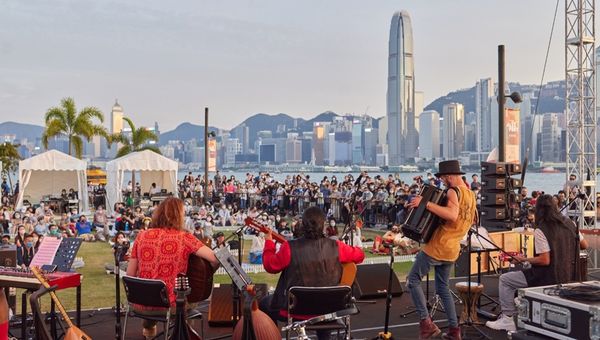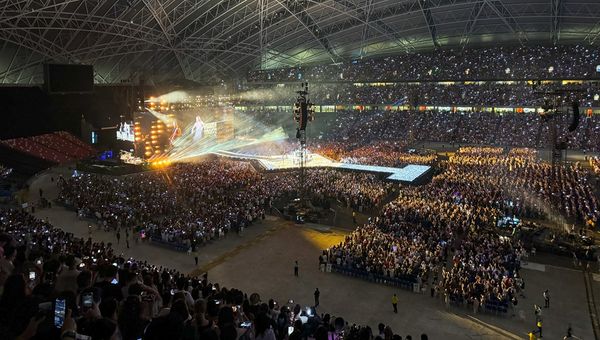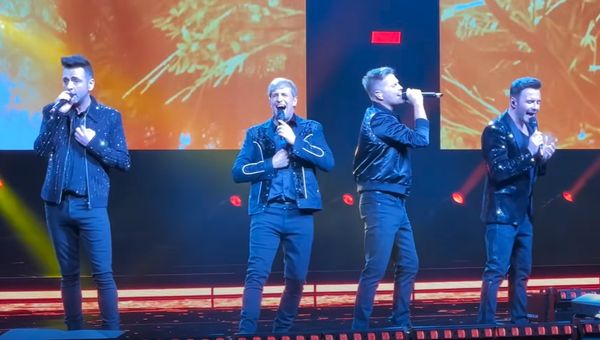Music sells, and it sells much more than just songs. According to a
2008 report by Mendip District Council (now part of Somerset Council)
the UK’s annual Glastonbury Festival generated approximately US$90
million (£73 million) in revenue for the area during its five days.
Similarly, the popular Coachella and its sister Stagecoach festivals in
southern California generated US$704 million in 2022 (according to the
Coachella Valley Economic Partnership and Greater Palm Springs
Convention and Visitors Bureau).
Tourism marches to the rhythm of concerts
With numbers like that it’s no wonder cities worldwide looking to
boost their tourism economies after the pandemic are using arts and
culture, including music, as springboard for recovery. As one of the
first to return to normalcy, Singapore is currently the leader in Asia
Pacific for music events. In March, the Lion City hosted superstar Taylor Swift for six exclusive nights.
Early analysis suggested nearly 70% of concert-goers were from
overseas, many willing to pay a reported SG$10,000 (US$7,500) for hotel
and show packages.
In nearby Hong Kong, where tourist arrivals exceeded 2018 levels
during the Lunar New Year holiday, rising numbers of visitors from
mainland China, still the city’s core source market, are increasingly
visiting to take part in cultural activities, exhibitions and concerts.
With the government making a conscious effort to revitalise Hong
Kong’s nighttime economy, it raises the question of whether the city is
ready or able to become an international music destination. The seeds
are there, particularly with the city’s flagship music festival,
Clockenflap, being majority purchased by international concert promoter
Live Nation in March 2023. Though its focus is on local and regional
independent acts, it’s welcomed its share of global headliners,
including Wu Tang Clan and Pulp.

The Freespace Jazz Festival, held annually in Hong Kong, celebrates jazz with performances by local and international artists. Photo Credit: WKCDA
“Hong Kong has, in my opinion, one of the best, if not the best
cultural content in this part of southern China. And so to travel
agencies and operators and promoters, I say I think they’d really,
really like coming to Hong Kong,” says Paul Tam, executive director of
performing arts for the West Kowloon Cultural District Authority. “I
think if arts and culture here is explored more internationally and
regionally it won't disappoint.”
Lierence Li, managing director of Market Hubs agrees that local
talent is something event organisers should be able to take advantage
of. A holistic cultural experience, including music and concerts, could
be an appealing value-add for MICE organisers. “Music is lively and
engaging, and so it could enhance the attendee experience,” Li argues.
“It provides a more social, relaxed atmosphere for networking and
music-related add-ons could help differentiate Hong Kong’s MICE events
from competitors, and create a unique selling point for event
organisers.”
Is the stage set for global megastars?
Tam’s annual Freespace Jazz Festival is a consistent success, and has
welcomed international artists including Richard Bona and Antonio
Sánchez. For Tam, the issue isn’t whether or not Hong Kong could be a
music destination, it’s a matter of when. “Hong Kong has a lot of
artistic equity, and we have one of, if not the best, transportation
system in the world and unrivalled infrastructural convenience. The one
thing that we don't have is the stadium.”

Taylor Swift performing in Singapore’s National Stadium in March 2024. Photo Credit: Cheryl Teo
Singapore hosted Taylor Swift at the 55,000-seat National Stadium.
Currently, Hong Kong’s largest venue is the venerable Coliseum, which
holds just 12,500. The few major touring shows that touch down in the
city are relegated to Asia-World Expo, the Hong Kong Convention and
Exhibition Centre, or other venues not ideal for music performances, and
the city’s Leisure and Cultural Services-managed venues (like the
Coliseum) are typically booked years in advance. That gap is expected to
be filled this year, with the completion of Kai Tak Sports Park and its
state-of-the-art multipurpose main stadium, with a capacity of 50,000.
“It’s the kind of venue a Madonna, or Beyoncé or Taylor Swift would
play,” says Tam.
Concerts are on the radar because, as Tam notes, banking doesn’t
attract cultural tourists that also visit galleries and dine out. Hong
Kong isn’t alone in considering leveraging its cultural equity, but
transforming into a music destination requires more work than has been
carried out to this point. “The question we have to ask is about how to
attract these international celebrities to Hong Kong, and we should look
to Singapore,” Dr Kenneth Kwong, assistant professor of marketing at
Hang Seng University, told RTHK in March. “The government took the
initiative with Taylor Swift and they gave her a great deal of support.
In Hong Kong it’s quite piecemeal right now.”
Hong Kong envisions striking a chord with music fans
The Hong Kong Tourism Board declined to comment, but Kenneth Wong,
general manager for MICE & Cruise and regional director for the Hong
Kong Tourism Board told March’s HICAP Update conference, “We will be
able to bring more exciting events to Hong Kong in the near future. The
government has set up a special unit at the HKTB for assessment and
there will be cross-bureau co-ordination.” That unit is part of the
HK$971 million earmarked for the tourism sector for 2024-2027 in the
budget announced in February. The funding will support and promote
large-scale international events with a dedicated committee.

Westlife performing at The Londoner Arena, Macao in November 2023. Photo Credit: Youtube/Carolstar Facts n Psy
Regional competition is another hurdle facing Hong Kong’s music
aspirations. Tokyo has deep music roots, Singapore has demonstrated its
ability to attract talent, and Macao’s entertainment infrastructure,
like The Londoner Macao’s new high-tech arena, continues to grow. “Hong
Kong is a financial centre, but Macau has casinos and entertainment. It
shouldn’t be seen as competition so much as a partner,” says Kwong. “The
two cities should collaborate. As an international city we need it to
raise our profile but need a long term plan.”
As Li sees it, the key to success is specificity, and making sure
Hong Kong shows off its singular character, otherwise, music organisers
will opt for alternate locations, and the chance to create valuable
add-ons for MICE events will be lost. Positioning Hong Kong as a
cultural destination should involve showcasing its unique cultural
identity through music events and initiatives and highlighting local
talent, curating music experiences that also show off traditional
Chinese music and Cantopop and integrating music in other art forms.
“It's one thing to listen to music on Spotify, but it's a totally
different experience coming out to enjoy music with your friends,”
finishes Tam, citing London and New York as music destination exemplars.
“I think it's about time Hong Kong wakes up to that kind of notion.”